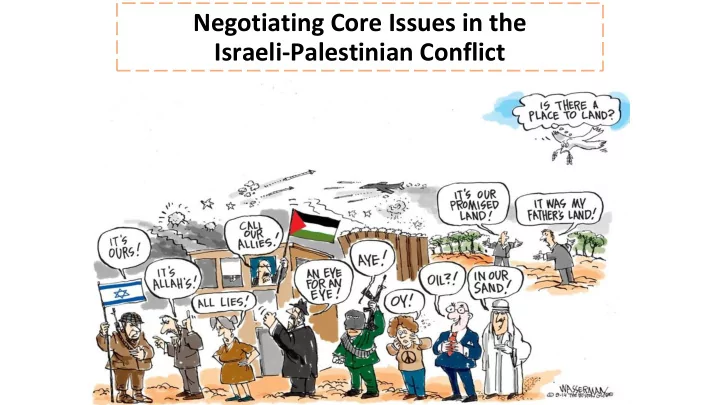

Negotiating Core Issues in the Israeli-Palestinian Conflict
Historic Background Zionist settlement in Ottoman (Turkish) Empire - 1881 World War I – 1914-1918 Sykes-Picot Agreement 1916 Balfour Declaration 1917 San Remo Conference 1920 (British Mandate confirmed by League of Nations 1922) Transjordan 1922 Riots 1929; 1936-1939
United Nation Partition Plan Resolution 181 Proposed “Jewish State” Proposed “Arab State” Internationally administrated “Corpus Seperatum” of Jerusalem
Armistice Lines 1949
Israeli “Borders” 1949-1967 the green line (West bank annexed by Jordan)
Israel after the Six Day War Territories won by Israel as of 10 June 1967
Meeting of Palestine National Council, Algiers, 1988 [Arafat UNGA speech, November 1988 and Press Conference December 1988] • PLO acceptance of 1947 UNGA Resolution 181 (that called for a Jewish state and an Arab state in Palestine), and declaration of Palestinian State based on that resolution. • Acceptance of UNSC Resolution 242 – two-state solution and Israel’s “right to exist within secure and recognized borders” • Renunciation of the use of terror.
Background to the Oslo Accords Impact of changes in international, regional and local environments on Palestinians ((1988): Lebanon War, Gorbachev, intifada on Israelis: new world order, Iraq War/PLO, Islamism, Iran, intifada, war fatigue
September 9, 1993 Yitzhak Rabin Prime Minister of Israel Mr. Prime Minister, The signing of the Declaration of Principles marks a new era in the history of the Middle East. In firm conviction thereof, I would like to confirm the following PLO commitments: The PLO recognizes the right of the State of Israel to exist in peace and security. The PLO accepts United Nations Security Council Resolutions 242 and 338. The PLO commits itself to the Middle East peace process, and to a peaceful resolution of the conflict between the two sides and declares that all outstanding issues relating to permanent status will be resolved through negotiations. The PLO considers that the signing of the Declaration of Principles constitutes a historic event, inaugurating a new epoch of peaceful coexistence, free from violence and all other acts which endanger peace and stability. Accordingly, the PLO renounces the use of terrorism and other acts of violence and will assume responsibility over all PLO elements and personnel in order to assure their compliance, prevent violations and discipline violators . In view of the promise of a new era and the signing of the Declaration of Principles and based on Palestinian acceptance of Security Council Resolutions 242 and 338, the PLO affirms that those articles of the Palestinian Covenant which deny Israel's right to exist, and the provisions of the Covenant which are inconsistent with the commitments of this letter are now inoperative and no longer valid. Consequently, the PLO undertakes to submit to the Palestinian National Council for formal approval the necessary changes in regard to the Palestinian Covenant. Sincerely, Yasser Arafat - Chairman, The Palestine Liberation Organization
Stage 1 – withdraw from Gaza and Jericho (complete by 6 months) – this begins the 5 year period. Stage 2 – immediately, transfer civil authority to the Palestinians in all of West Bank (health, education, welfare, etc.). Stage 3 – reach interim agreement on Palestinian Authority (jurisdiction, powers, etc.) plus elections to Palestinian Legislative Council – accomplish no later than 9 months from beginning of process. Stage 4 – agreement on Permanent Status of West Bank and Gaza – negotiations to begin no later than 3 years from beginning of process and end no later than 5 years from the beginning of the process.
Problems: Positive effects: Interim agreement optimism on both sides Islamic terror attacks peace with Jordan Delays diplomatic relations doubled No monitoring economic windfall External security people to people activities Settlements No end-game
Oslo II – Further Redeployment
“A territory of at least 11%, which 80% of the settlers live in, will be annexed to Israel. We will not transfer land which is under Israeli sovereignty (land swap) to the Palestinians. Palestinian refugees will not have the right of return to Israel. The Palestinian state will be demilitarized and security arrangements will be set accordingly. Israel will control a quarter of the Jordan Valley for a few years in order to guarantee its control in the Jordan-Palestine crossings”.
Land for Palestinian State (percentages of West Bank) • Camp David II (Barak) 2000: 93% (92%) then 88-90% (87%) 1:9 swap • Clinton Parameters 2000: 94-96% later said 97% 1:1 swap • Olmert 2008: 94% 5.8% swaps (3% in swaps and1.5% safe passage, port access, no-man’s land?) • Abu Mazen 2008: 1.9%
lessons • Key issue for Israel = Security (and minimum dislocation of settlers) • Key issue for Palestinians = Borders (where the contiguous, sovereign state will be) • Jordan Rift Valley = border of Palestine with Jordan, completes total land border of Palestine with Israel • Refugees and Jerusalem issues – unofficial solutions in Olmert-Abu Mazen and API (even Arafat-Barak discussions, i.e. focus on numbers re refugees; Clinton Parameters for Jerusalem) • Avoid “all is ours” approach – focus on interests and needs of each side • Avoid symmetry of “tit for tat” approach (reciprocity) – Palestinians already conceded 78% (1988 “historic compromise” for mini-state in the WB and Gaza) Regional Approach: • Opportunity today for regional approach (Israeli-Arab States’ anti-Iran cooperation) • Provides backing for Palestinian concessions on Jerusalem • Provides legitimacy (acceptance) in region long sought by Israel
Recommend
More recommend